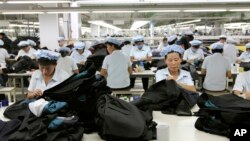South Korea said it is open to a North Korean demand for higher wages for its workers at the Kaesong Industrial Complex, if the increase is within the salary cap.
Seoul and Pyongyang have been at odds on the matter since November, when Pyongyang decided to remove the cap that limits wage increases to 5 percent a year. Last month, Pyongyang notified Seoul it was increasing the minimum monthly wage from $70.35 to $74, an increase slightly above 5 percent.
On Wednesday, a group of South Korean businessmen met with North Korean officials at the complex to try to resolve the issue.
In an apparent attempt to break the standoff, South Korea’s Unification Ministry said Friday that the government was willing to discuss the wage increase in accordance with an inter-Korean agreement.
“Considering the companies’ request to resolve the differences over the minimum wage increase in a prompt manner, our position is that such is possible through negotiations between the [South Korean] management committee and the North Korean authorities within the previously agreed upon range of 5 percent,” Lim Byeong-cheol, spokesman for South Korea’s Unification Ministry, told reporters.
The complex, a rare combination of business and politics, has offered South Korean companies struggling with rising labor costs an opportunity to use cheap labor. The companies, mostly small and midsize manufacturers, endured uncertainties of inter-Korean relations with relatively minor problems until April 2013, when Pyongyang unilaterally shut down the complex. The shutdown took a heavy financial toll on the companies and lasted more than four months.
Seoul then engaged in intensive talks with Pyongyang that resulted in a series of agreements, including Pyongyang’s promise not to take unilateral actions.
Yoo Chang-keun, vice chairman of the South’s Kaesong Industrial Complex Business Association, said low productivity was one of many challenges that the companies were facing.
“Unlike China or Vietnam, the workforce in Kaesong is not trained. So the businesses have to take on the burden of training them for a certain period of time,” Yoo said in a phone interview with the VOA Korean service this week. "The productivity would often remain stagnant after rising a bit following the training.”
According to Yoo, South Korean business officials raised the productivity issue with North Korean officials at the meeting about the wage increase.
More than 53,000 North Korean workers are employed by about 120 South Korean factories in the park.
Jee Abbey Lee and Kim Yonho contributed to this report.
